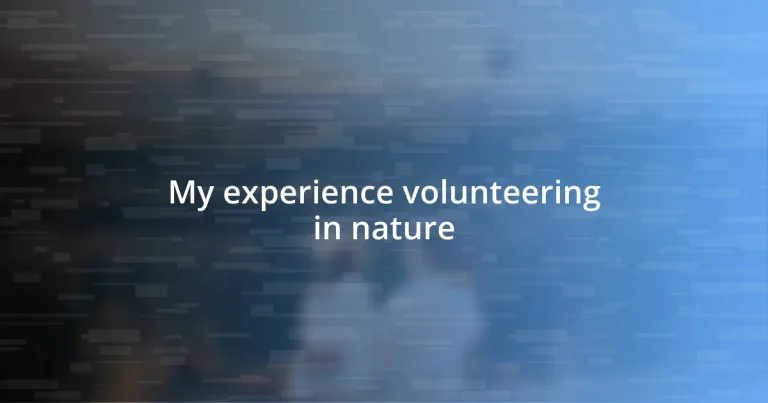Key takeaways:
- Volunteering in nature fosters a deep connection with the environment, enhances personal growth, and strengthens community bonds through shared experiences.
- Hands-on activities, like tree planting and habitat restoration, provide valuable skills such as teamwork, problem-solving, and increased awareness of environmental sustainability.
- Challenges faced during volunteering, including physical endurance and navigating diverse opinions, highlight the importance of perseverance, collaboration, and adaptability in achieving common goals.
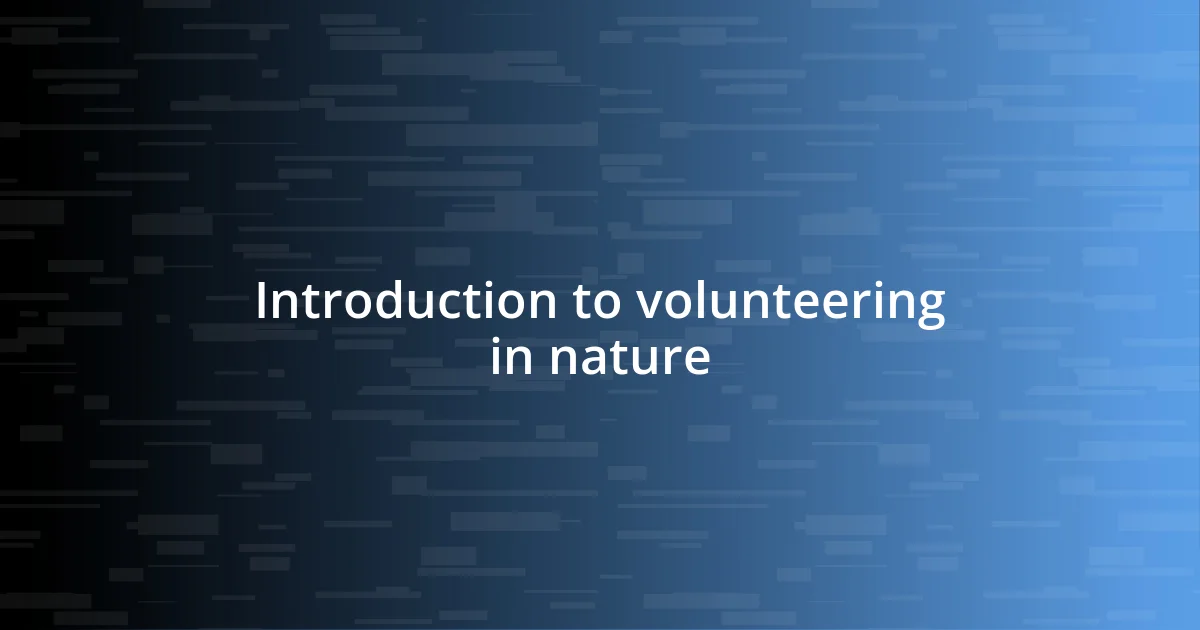
Introduction to volunteering in nature
Volunteering in nature isn’t just an activity; it’s a profound journey of self-discovery and connection. I remember my first volunteer day at a local nature reserve; the moment I stepped into the tranquil surroundings, I felt an overwhelming sense of peace wash over me. Have you ever experienced that thrill of being part of something greater than yourself while working to protect our precious environments?
Engaging with nature through volunteering enables us to appreciate its beauty while contributing to its preservation. I was amazed at how planting trees not only helped the planet but also created a sense of community among the volunteers. It made me wonder—what stories do these trees have, and how many lives will they touch in the years to come?
This kind of experiential volunteering offers unique insights into environmental issues. The hands-on activities opened my eyes to the challenges faced by ecosystems and the importance of conservation efforts. How often do we pause to consider our role in this complex web of life? Each small action during my time volunteering felt like an essential piece of a larger puzzle, reminding me that every bit counts in our collective efforts to protect nature.
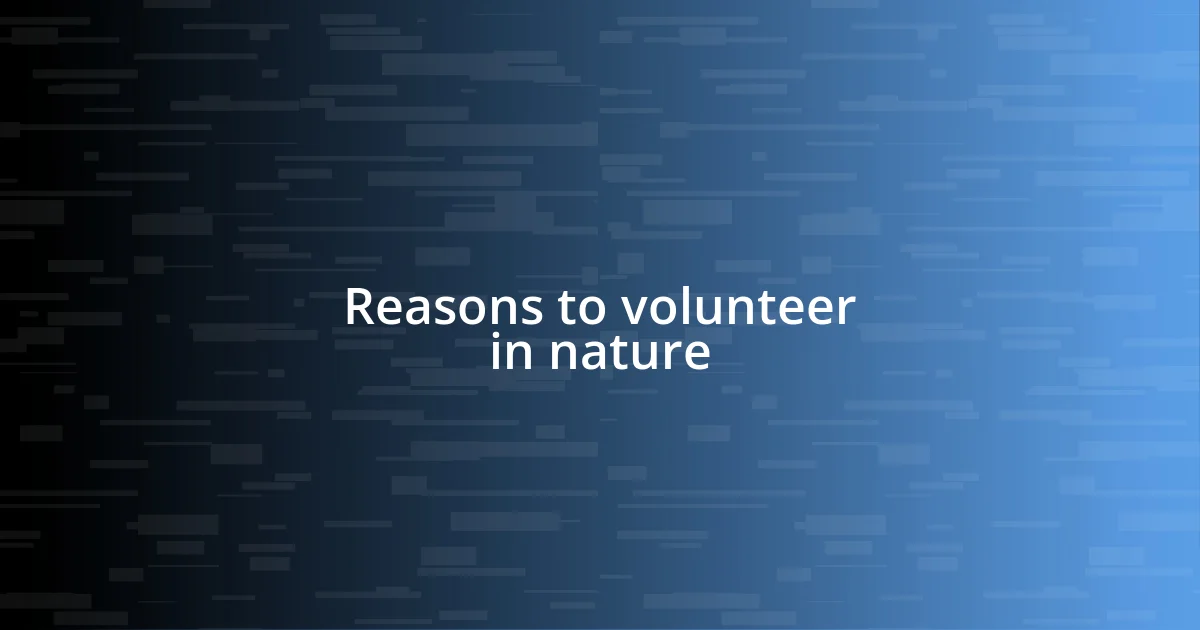
Reasons to volunteer in nature
Volunteering in nature offers an incredible opportunity to connect not just with the environment, but also with ourselves. I’ll never forget the time I helped restore a local wetland. The muddy hands and the cold water felt invigorating, but it was the chorus of frogs and the chatter of birds that truly brought the experience to life. Being surrounded by such vibrant ecosystems reminded me of how intertwined our well-being is with the health of our planet.
Here are some compelling reasons to consider volunteering in nature:
- Connection with Nature: Spending time outdoors fosters a deeper appreciation for the natural world and its wonders.
- Building Community: Working alongside others who share a passion for the environment creates strong bonds and friendships.
- Personal Growth: Engaging in physically demanding tasks can boost confidence and resilience, proving to us that we’re capable of more than we think.
- Learning Opportunities: I’ve picked up valuable skills, from planting techniques to wildlife identification, that I apply in my daily life.
- Making a Difference: Each action has a ripple effect; even small contributions help combat larger environmental issues.
Every moment I spent volunteers solidified my commitment to environmental stewardship, a feeling that lingers long after the work is done. The joy of knowing I was part of something so meaningful still brings a smile to my face.
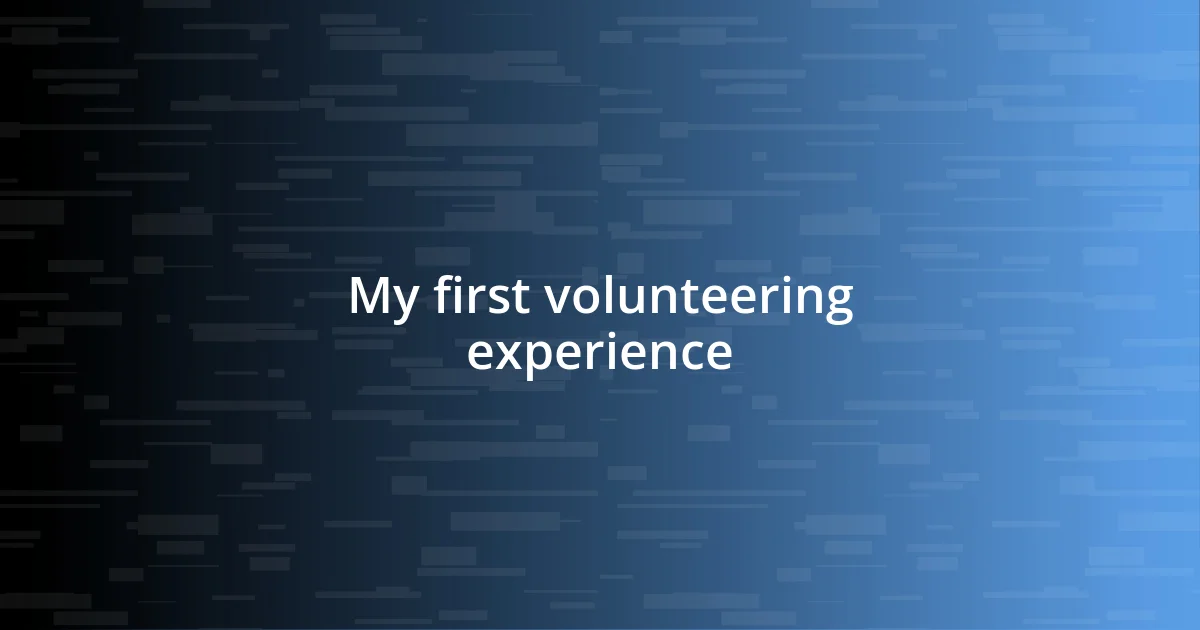
My first volunteering experience
Volunteering for the first time felt like stepping into a new world. I vividly recall that day at the park, where my task was to clear debris from a riverbank. As I pulled up tangled weeds, I was struck by the sound of water flowing and birds singing. It was as if nature was welcoming me into its fold, and I couldn’t help but feel a sense of joy in being part of this essential task.
That experience didn’t just build my physical strength; it fostered an emotional connection to the earth. Each piece of litter I removed seemed to symbolize a small victory for the ecosystem. Have you ever felt that rush of satisfaction from doing something so simple yet so important? The camaraderie among the other volunteers deepened my appreciation for teamwork, as we shared stories and laughed over our muddy shoes, creating an atmosphere of support and friendship.
Reflecting on my first volunteering day, I can see how transformative it was. I remember looking around at the beautiful trees and sparkling water, feeling proud of what we had accomplished together. That moment sparked a desire in me to continue giving back to nature, and I knew this was just the beginning of my journey. Each experience led me to discover more about not only the environment but also myself.
| Aspect | Details |
|---|---|
| Location | Local nature reserve |
| Activity | Clearing debris from a riverbank |
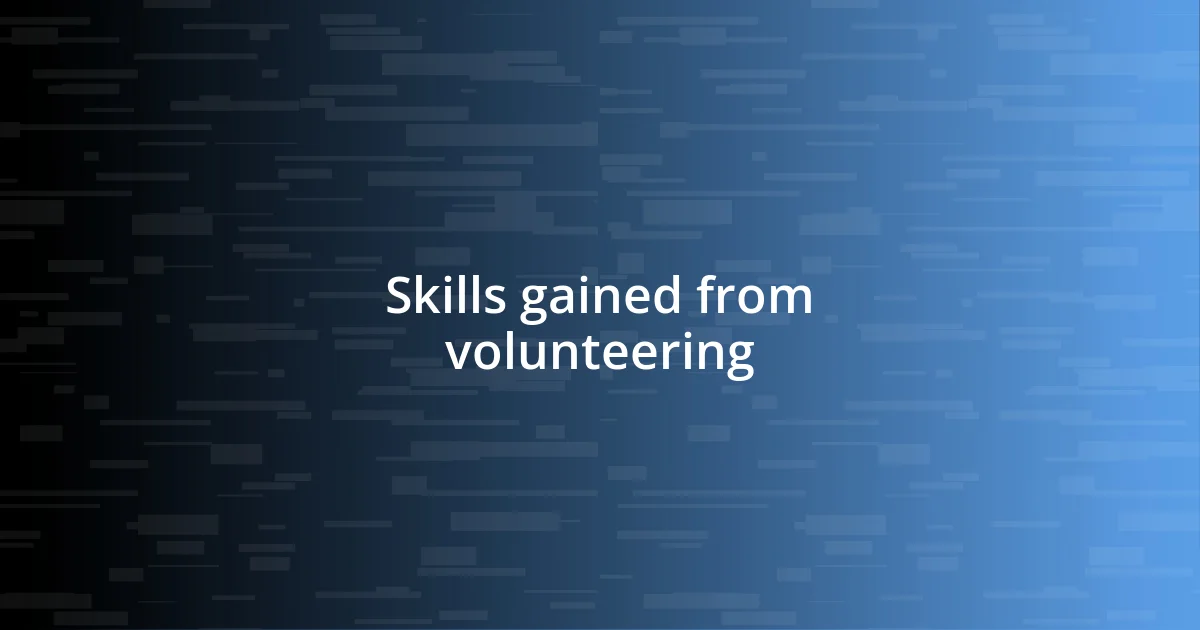
Skills gained from volunteering
When I think about the skills I gained from volunteering, the first that comes to mind is teamwork. Collaborating with a diverse group of volunteers taught me how to communicate effectively and coordinate tasks efficiently. Have you ever noticed how a shared goal can unite people? I certainly did when we all rallied together to plant trees—our hands created a rhythm that made the work feel almost like a dance.
Another skill that developed was problem-solving. I recall a day when we encountered unexpected weather. Instead of letting the rain deter us, we adapted our plans on the fly. We sought shelter, swapped stories, and brainstormed how to maximize our efforts once the rain subsided. This ability to think on my feet and remain resilient has been invaluable in everyday life.
Additionally, I emerged with a greater appreciation for nature, which deepened my understanding of environmental sustainability. Learning about the delicate interactions within ecosystems allowed me to contribute to meaningful discussions surrounding conservation. I found myself reflecting on how each small action—like picking up litter or planting native species—can lead to positive change. Isn’t it amazing to think that our efforts can create ripples of impact in the environment?
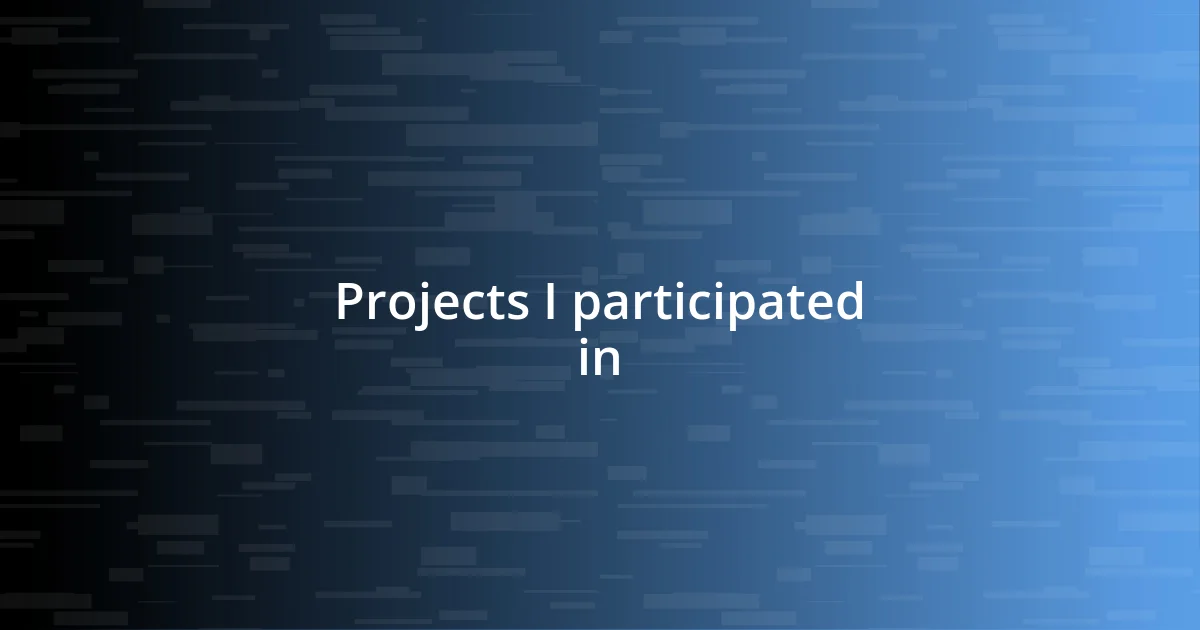
Projects I participated in
One project that stands out in my memory is the community beach clean-up. I remember arriving early and seeing the vast stretch of sand, glittering in the sun, asking to be restored. As we combed the shoreline, collecting everything from plastic bottles to tangled fishing nets, I felt a wave of energy surging through the group. It was underlined by a shared urgency to protect this marine habitat, which made each piece of trash we collected feel like a step toward preservation.
Another memorable experience was working in a local botanical garden, where I helped create a butterfly habitat. Planting various nectar-rich flowers was both rewarding and calming. I found it fascinating to think about how these small plants could attract countless butterflies and support local biodiversity. It was an emotional high to see the first fluttering visitors arrive, as if they were thanking us for our efforts. Have you ever experienced that moment of connection when nature seems to acknowledge your hard work?
I also participated in an invasive species removal project, where we focused on restoring native flora. On that day, we hiked deep into the woods—each step fueled by anticipation for what we would uncover. As we dug out aggressive plants that choked the life out of the ecosystem, I felt like we were reclaiming the forest one patch at a time. The satisfaction that washed over me when I saw the cleared areas gradually transform was indescribable. It made me appreciate the resilience of nature and the importance of our role in its stewardship.
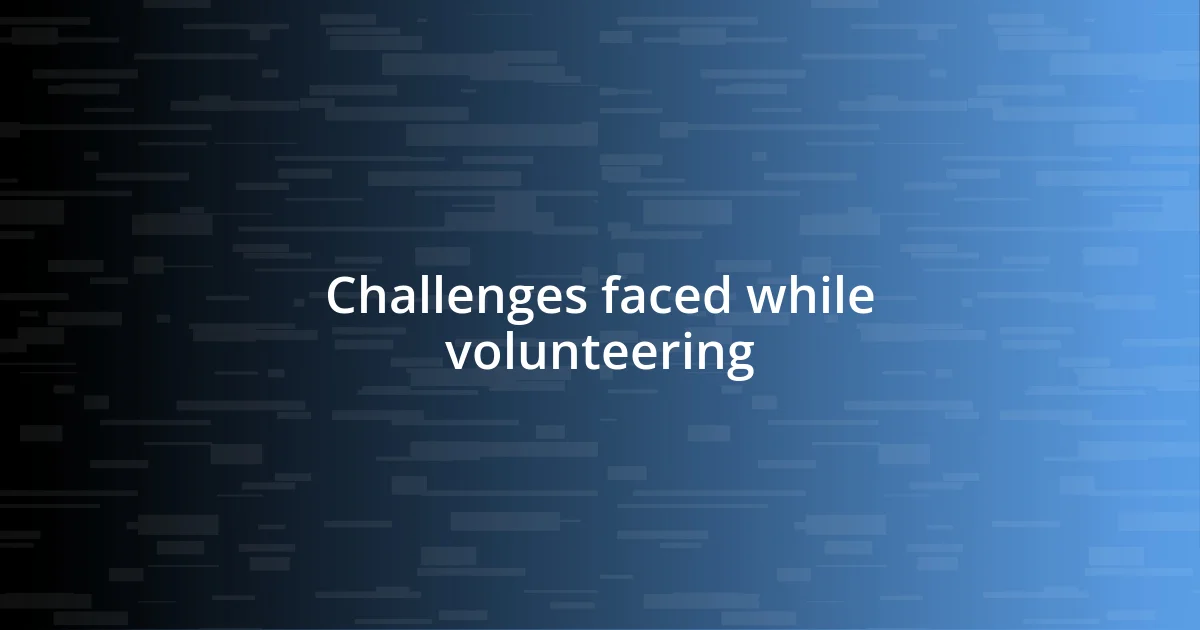
Challenges faced while volunteering
Volunteering in nature brought its share of challenges, and I quickly learned that physical endurance is key. There were moments when the trails felt endless, and I could feel my muscles protesting with each step. I often asked myself, “Can I really push through this fatigue?” Yet, every time I persevered, I discovered a strength within that I didn’t know I had.
Another hurdle was navigating the diverse opinions within our group. I remember a particularly tense meeting where we debated the best approach to a restoration project. With varying perspectives on the most effective methods, it felt like we were going in circles. I realized then that reaching a common ground required patience and an open mind, teaching me the value of collaboration in achieving our shared goals.
Lastly, weather unpredictability posed a challenge I hadn’t anticipated. On a day meant for planting, dark clouds rolled in, and I wondered, “How will this affect our plans?” Rather than being disheartened, our team embraced the rain, transforming the day into an impromptu brainstorming session. This taught me that adaptability can turn potential setbacks into opportunities for creativity. Isn’t it fascinating how a little rain can sometimes lead to blooming ideas?












